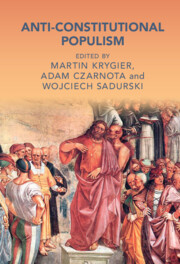Book contents
- Anti-Constitutional Populism
- Cambridge Studies in Law and Society
- Anti-Constitutional Populism
- Copyright page
- Contents
- Figures
- Contributors
- Acknowledgements
- Introduction: Anti-Constitutional Populism
- I Populisms
- II Courts
- III Anti-Constitutionalism After Post-Communism
- Chapter 8 Conservative Populism in Defiance of Anti-Totalitarian Constitutional Democracy
- Chapter 9 Constitutional Populism and the Rule of Law in Poland
- Chapter 10 Populism or Authoritarianism? A Plaidoyer Against Illiberal or Authoritarian Constitutionalism
- IV Eu Responses
- V Concluding Reflections
- Index
- Cambridge Studies in Law and Society
- References
Chapter 8 - Conservative Populism in Defiance of Anti-Totalitarian Constitutional Democracy
from III - Anti-Constitutionalism After Post-Communism
Published online by Cambridge University Press: 24 March 2022
- Anti-Constitutional Populism
- Cambridge Studies in Law and Society
- Anti-Constitutional Populism
- Copyright page
- Contents
- Figures
- Contributors
- Acknowledgements
- Introduction: Anti-Constitutional Populism
- I Populisms
- II Courts
- III Anti-Constitutionalism After Post-Communism
- Chapter 8 Conservative Populism in Defiance of Anti-Totalitarian Constitutional Democracy
- Chapter 9 Constitutional Populism and the Rule of Law in Poland
- Chapter 10 Populism or Authoritarianism? A Plaidoyer Against Illiberal or Authoritarian Constitutionalism
- IV Eu Responses
- V Concluding Reflections
- Index
- Cambridge Studies in Law and Society
- References
Summary
For a long time, democratisation in East-Central Europe has been understood as a process of convergence towards (Western) European models of liberal and constitutional democracy. The process of the construction of democracy became increasingly understood as relatively complete, in that former communist countries were considered to have reached relatively mature or ‘consolidated’ versions of liberal democracy by the time of their entry into the EU.1 The narrative of ‘consolidated democracy’, with its emphasis on rapprochement of the Western model and completion of the liberal-democratic design, is likely to have overlooked the dimension of structural conflict in these societies, both with regard to the – in many ways – ambiguous rupture with communism in 1989 and the process of polity-making and democracy-building in its wake. The argument in this chapter is that in some post-communist societies the construction of political communities and the constitution of liberal democracy remained conflictual and contested during the entire period of transformation. In some countries, in particular Hungary and Poland, the current ‘backlash’ or democratic crisis did not ‘fall from the sky’, but is part and parcel of an ongoing struggle over the finalité of post-communist transformation.
- Type
- Chapter
- Information
- Anti-Constitutional Populism , pp. 297 - 335Publisher: Cambridge University PressPrint publication year: 2022
References
- 1
- Cited by

